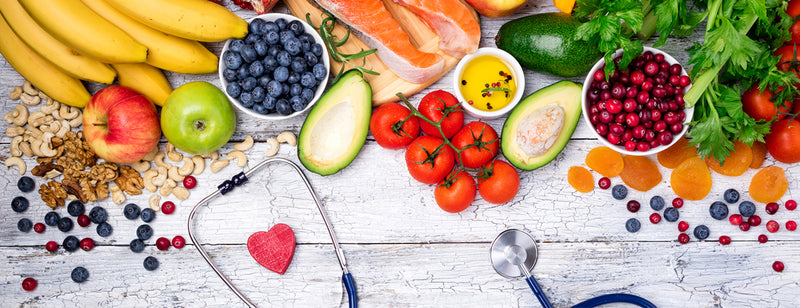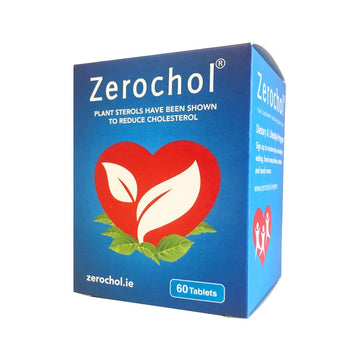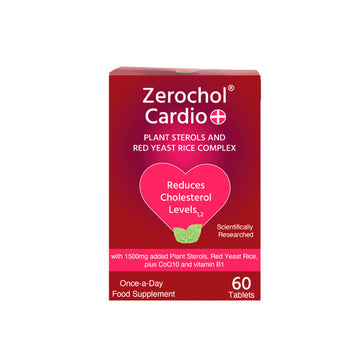Cardiovascular disease is Ireland's biggest killer for both men and women. The most common risk factors of heart disease include family history, gender, stress, unhealthy diet, lack of exercise, smoking, obesity and high blood pressure levels. Many risk factors are silent and can easily go unnoticed. One such 'silent' risk factor to your heart health is cholesterol. So what is cholesterol and what can you do about it? We take a look at what cholesterol is as well as 7 ways to lower cholesterol naturally.
What is cholesterol?
Cholesterol is a fatty substance found in the body, which is essential for maintaining normal cell membrane and hormone production in the body. However, high cholesterol levels can increase your risk of heart disease.
Types of Cholesterol
There are two types of cholesterol, LDL and HDL.
Low Density Lipoprotein - LDL
Low Density Lipoprotein (LDL) cholesterol is often known as 'bad' cholesterol. Its role is to transport cholesterol around your body to the cells that need it. However, any excess cholesterol that is produced, builds up on the walls of the arteries and can lead to hardening of the arteries (atherosclerosis) and in turn, raise the risk of heart attack or stroke.
VLDL (Very Low Density Lipoproteins) is similar to LDL in that it contains mostly fat and carries another type of fat: triglycerides, in the blood. Excess calories, alcohol, or sugar in your body are converted into triglycerides and stored in fat cells throughout your body.
High Density Lipoprotein - HDL
On the other hand, ‘good’ or ‘healthy’ cholesterol is known as High Density Lipoprotein (HDL). This cholesterol mops up excess cholesterol left behind in your arteries and carries it to the liver, where it is broken down and passed out of the body. Therefore, to stop your cholesterol levels getting too high, you must increase your levels of HDL and decrease your levels of LDL.
How to check cholesterol levels:
In order to keep your cholesterol levels in check, it is important to have regular blood tests taken by your doctor. Healthy levels are estimated as:
- Total cholesterol: below 5 mmol/L
- LDL levels: below 3 mmol/L
- HDL levels: greater than 1 mmol/L
If your levels are bordering on unhealthy, you may find that making some simple lifestyle changes can result in a decrease in cholesterol levels without the use of any medication. So what exactly are these changes - how can you lower cholesterol naturally?
Ways to Lower Cholesterol Naturally
There is lots you can do to help lower your cholesterol naturally. Here are some tips you can work in to your daily life from watching the way you cook to upping your fibre intake.
1. Reduce Your Saturated Fats
In order to reduce the risk of heart disease, it is important to limit the amount of saturated fat in the diet as this can raise cholesterol levels. Saturated fats are solid at room temperature and are found in products such as:
- cream
- butter
- cheese
- fatty cuts of meats
- processed meat products
Processed foods such as cakes, biscuits, fried and deep fried snack foods should also also be avoided as they are particularly high in saturated fat. Foods such as eggs, shellfish, liver and dairy products all contain cholesterol. If eaten as part of a healthy, balanced diet, they should not cause a substantial rise in cholesterol levels.
2. Incorporate Good Fats
It is important to remember however, that not all fats are bad for us. Some fats are essential and can actually help to effectively raise our HDL levels. Such fats include the essential fatty acid, Omega 3. Foods rich in Omega 3 include oily fish such as salmon, mackerel and sardines. It is recommended that we eat 2 to 3 portions of oily fish a week.
If you struggle to fit this amount of oily fish into your diet, taking a quality fish oil supplement may be a better option. A supplement which contains EPA and DHA levels over 250mg can help to increase your Omega 3 intake substantially. Other foods which are rich in 'good fats' include:
- almonds
- brazil nuts
- walnuts
- flaxseed
- linseed
- chia seed
- sunflower seeds
- pumpkin seeds
- rapeseed oil
- olive oil
- coconut oil
3. Use Healthy Cooking Methods
If possible, try to steam, bake or boil your foods instead of frying.
4. Switch Your Spreads
Replace butter with spreads made from rapeseed, sunflower or olive oil. Avoid the use of 'low fat' spreads as these contain trans - or hydrogenated fats - which can raise cholesterol levels.
5. Up Your Fibre Intake
Fibre is very important for the removal of excess cholesterol from the bowels. Foods which are high in dietary fibre include vegetables and wholegrains.
6. Consider Supplements
Red Yeast Rice is a popular supplement that can help lower cholesterol, especially if your diet is already very clean, and genetics may be what is affecting your levels.
If diet does concern you, Zerochol is a supplement of plant sterols. These natural substances (also known as phytosterols) are present naturally in small quantities in many fruits, vegetables, nuts, seeds, and other plant sources. By taking Zerochol with your meal, the plant sterols could help to inhibit the absorption of cholesterol from the meal.
7. Exercise Regularly
Regular exercise has also been found to increase your 'good' cholesterol levels and reduce the level of 'bad' cholesterol. Aim to exercise a couple of days a week to a point where you increase your heart rate and break a sweat. Many potential cardiovascular issues can be prevented or slowed down by making some simple, regular changes to your lifestyle.
Please note, this blog is for informational purposes only and should not replace medical advice.
It’s always best to consult your doctor before taking any new supplements, treatments or remedies if you are pregnant, breastfeeding or on medication.
Checked and updated: 9 August 2021















